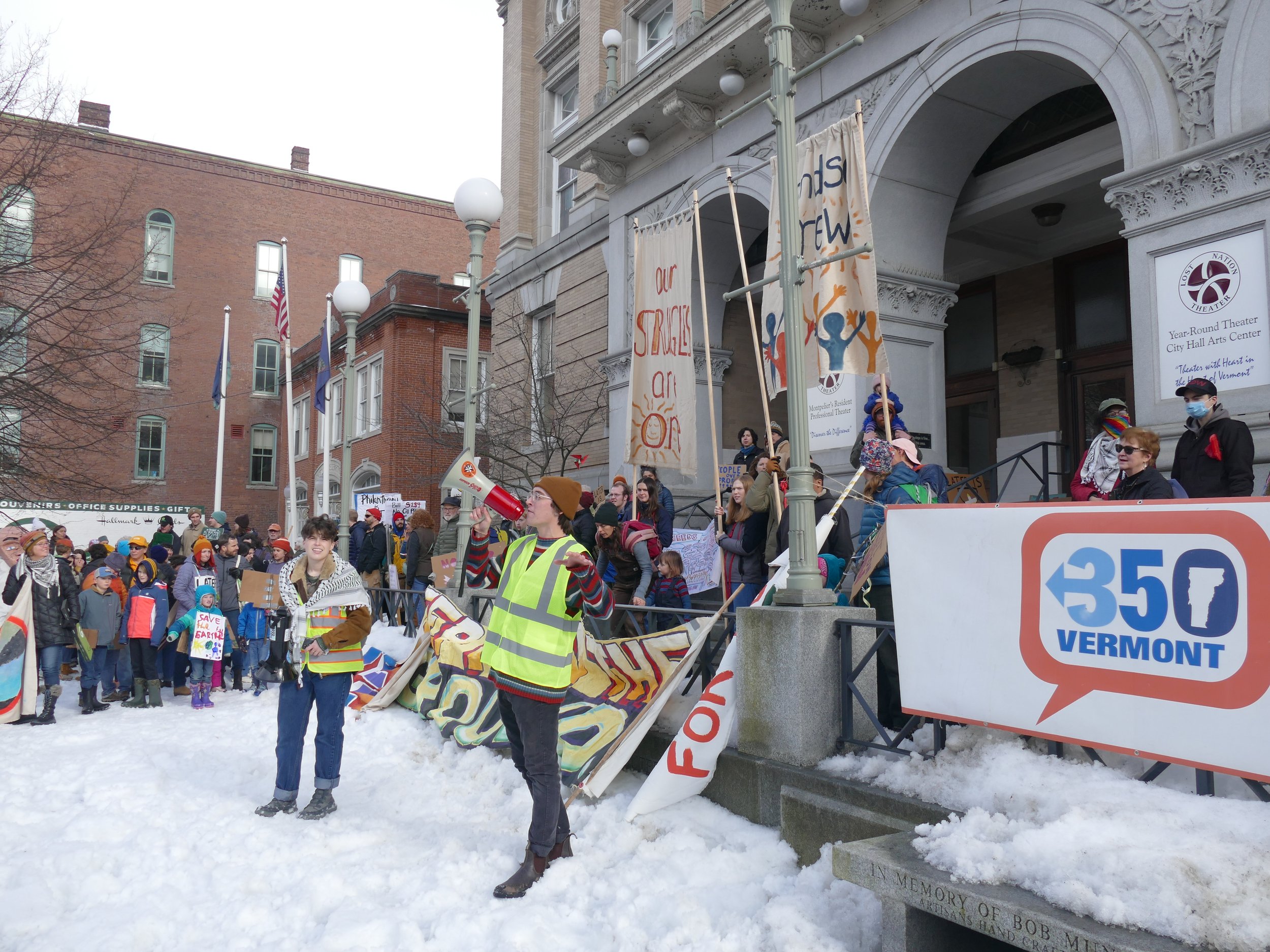Cultivating resistance: let’s grow VT’s social movements, together
By Connor WertzFacing the climate crisis – and the underlying ‘ism’s that perpetuate it – is the challenge of our time. It was what propelled me, as a teenager, to take that first, uncertain step to try to change the world we’ve been given. It hasn’t been an easy ride. From Trump’s victory the very first time I stepped into a ballot box, to experiencing the flooding and wildfire smoke of our new climate reality in Vermont, an edge of despair shadows the longing to make a difference. It’s a feeling you have likely felt.
Yet what has grounded me in hope, again and again, is the dedication and work I have seen everyday Vermonters take on – and the victories I have experienced that are possible when we come together in community, grounded in a shared vision for a better future. I have jumped into pipeline construction, and witnessed the power of direct action. I have spent time in statehouses, pushing for policy change from the inside, and led marches from the Climate Strikes of 2019 to 350VT’s statehouse rallies in the winter. Throughout this time as a youth and young adult activist, 350Vermont has emerged as a home-base for changemaking. And while the conditions of the world are even more dire from when I began, I feel more optimistic and determined than ever, because of the people that make up this network and the lessons they have taught me.
As I leave 350VT’s community organizing role, here are some of those lessons that I’d like to share.
Connor, speaking at our Vermonters Together for a Better Future Rally, this past February
1) Social change is not spontaneous–it is created. And it’s a skill we must practice together.
When I was a teenager, I was taught that the protests that have changed the landscape of our country – from Rosa Parks and the Civil Rights Movement, to the abolitionists of the 19th century – arose from nothing, like an uncertain weather pattern. Instead of waiting for the “right” conditions to come, however, I’ve learned that these foundational shifts are often precipitated by the work and legacy of power-building organizations–groups of people who get in gear, plan their strategy, and move proactively.
Rosa Parks did not spontaneously decide to keep her seat on that bus – she trained, connected with a coalition of activists, and moved decisively. In the same way, we must build our skills and networks, strategize, and act together. 350Vermont is doing this incredible, transformative work. I’ve participated in and led dozens of workshops, from campaign strategy, to how to have an organizing conversation with a stranger, to meeting with our legislators. I have seen myself and others grow, starting as uncertain participants and transforming into local leaders. We are in active practice: experimenting, occasionally plodding, improving on our organizing formulas, building people power the whole way. Practicing social change is a connective and empowering way to spend one’s time, and we need more of us doing it.
2) Power building organizations are the nexus of local & statewide change. We need more of them in Vermont.
When I first came to Vermont, I thought we were in pretty good hands. Quickly, however, I learned that our Green Mountain State is struggling. VT is sorely behind on the strong climate action we need to clean up our game. We are staring down an entrenched housing crisis and a drop in public services like public transportation and rural education. It can seem like there’s no clear way out of the damage that climate-exacerbated storms, sky-high rents, a pandemic, and more have brought to our home state.
Instead of relying on our elected officials to come up with the change we are waiting to see, power-building organizations take matters into their own hands. By starting in our communities, and advocating from the ground up – from local to state policy – 350Vermont and an assembly of other organizations like Rural Vermont, Migrant Justice, RELEAF, and NEKO, are networking communities of care and simultaneously raising the political will to move Vermont forward.
“Power” can be an icky word. But if we’re to face the crisis in front of us, we need to get serious about how to build power responsibly. Grassroots organizing is an excellent way to do this, because it attempts to build communities of power, instead of entrusting our power to someone else. 350Vermont’s model of empowering communities to take change into their own hands is the work that needs to be done right now.
3) Have the intention to organize effectively, and the trust to be organized effectively
With the “polycrisis” of issues we’re experiencing, it’s impossible to take everything on yourself, or to know the solutions for every problem. In fact, I have always felt the least impactful and most overwhelmed when I’ve tried. Don’t worry about doing everything. Your heart might be in 5 places at once, but chances are your hands (and your head) are too busy for all that.
There are like-minded people who are here with us. Giving yourself the space in your life to be organized is an act of trust, and generosity. You might not know everything about the strategy, the impact, or the issue. You might have had a long week, and the thought of opening an email and calling your representative is just, well, bleh. But to trust that a call to action is needed when it is – and to respond with your time, your money, or attention – is to pray with your feet. It enables you to make a difference across issues, to de-silo your impact and become a member of an entire social movement.
At the same time, 350VT’s life-blood comes from its dozens and dozens of members who, with intention, start to organize themselves and their communities. With just a handful of staff, 350VT has built a statewide network capable of shifting VT’s policy landscape, engaging in coalitions within and outside of climate work, and leaving last session 3/3 with our priority bills.
How did we do that? By inviting Vermonters from all walks of life to step into active leadership, and cultivating the community and purpose needed for a collective direction. From maple sugarers to college students, intergenerational Vermonters to recent arrivals, 350VT’s dozen-plus member-led teams coordinate their own work and discover for themselves what it’s like to do the transformative, grassroots work VT needs.
350 Chittenden node, demonstrating in front of Burlington’s Penny Lane Peaker Plant this August Fixing the power problem
In Vermont – just as in our country – we have a power problem. If you can hire lobbyists and policy-analysts, donate to election campaigns, and pay a PR firm to clean up your image, you’ll be able to shape power. We’ve seen this from our utility companies, who wield outsized influence behind the scenes as VT crafts its climate bills.
Although we’re up against a seriously rigged game, I have seen the ways in which small groups of people, working on issues with broad public support, can really move the needle for our collective futures. I hope you’ll consider joining 350VT, as they continue to build their people power, move with intention, and keep fighting for our futures.
Click here to fill out our welcome form, and get involved!
In Solidarity,
Connnor


